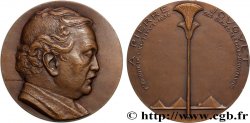E-auction 599-566844 - fme_935147 - III REPUBLIC Médaille, Clémenceau et l’UMFIA
You must signin and be an approved bidder to bid, LOGIN TO BID. Accounts are subject to approval and the approval process takes place within 48 hours. Do not wait until the day a sale closes to register. Clicking on « bid » constitutes acceptance of the terms of use of cgb.fr private e-auctions.
Bids must be placed in whole Euro amounts only. The sale will start closing at the time stated on the item description; any bids received at the site after the closing time will not be executed. Transmission times may vary and bids could be rejected if you wait until the last second. For further information ckeck the E-auctions F.A.Q.
NO BUYER'S FEE.
NO BUYER'S FEE.
| Estimate : | 40 € |
| Price : | 11 € |
| Maximum bid : | 11 € |
| End of the sale : | 07 October 2024 21:10:00 |
| bidders : | 5 bidders |
Type : Médaille, Clémenceau et l’UMFIA
Date: 1933
Mint name / Town : 75 - Paris
Metal : bronze
Diameter : 68,5 mm
Orientation dies : 12 h.
Engraver VILLANDRE Charles
Weight : 145,95 g.
Edge : lisse + V. CANALE + triangle
Puncheon : Triangle
Coments on the condition:
Patine hétérogène avec des taches d’oxydation. Présence de traces d’usure, coups et rayures
Obverse
Obverse legend : CLEMENCEAU DOCTEUR EN MÉDECINE MAI 1865.
Obverse description : Tête de Clémenceau à droite. Signé : VILLANDRE .
Reverse
Reverse legend : MÉDAILLE COMMÉMORATIVE / JUBILE MÉDICAL // PRÉSIDENT D’HONNEUR FONDATEUR / DE L’ / UMFIA / 11 NOVEMBRE 1933.
Reverse description : Lampe antique posée sur des cartouches contenant 5 lignes de légendes.
Commentary
Georges Benjamin Clemenceau, né le 28 septembre 1841 à Mouilleron-en-Pareds (Vendée) et mort le 24 novembre 1929 à Paris, est un homme d'État français, radical-socialiste, président du Conseil de 1906 à 1909, puis de 1917 à 1920.
Fils de médecin et médecin lui-même, il est maire du 18e arrondissement de Paris puis président du conseil municipal de Paris au début de la Troisième République, ainsi que député en 1871 et de 1876 à 1893, siégeant en tant que républicain radical. Défenseur de l'amnistie pour les Communards, et anticlérical, il prône la séparation des Églises et de l'État et s'oppose à la colonisation, faisant tomber le gouvernement Jules Ferry sur cette question. Fondateur du journal La Justice et de la Société des droits de l'homme et du citoyen, il travaille ensuite à L'Aurore et prend une part active dans la défense du capitaine Dreyfus. Il ne cessa de militer en faveur de la restitution de l'Alsace-Moselle, perdues à la suite de la défaite de 1871.
Fils de médecin et médecin lui-même, il est maire du 18e arrondissement de Paris puis président du conseil municipal de Paris au début de la Troisième République, ainsi que député en 1871 et de 1876 à 1893, siégeant en tant que républicain radical. Défenseur de l'amnistie pour les Communards, et anticlérical, il prône la séparation des Églises et de l'État et s'oppose à la colonisation, faisant tomber le gouvernement Jules Ferry sur cette question. Fondateur du journal La Justice et de la Société des droits de l'homme et du citoyen, il travaille ensuite à L'Aurore et prend une part active dans la défense du capitaine Dreyfus. Il ne cessa de militer en faveur de la restitution de l'Alsace-Moselle, perdues à la suite de la défaite de 1871.








 Report a mistake
Report a mistake Print the page
Print the page Share my selection
Share my selection Ask a question
Ask a question Consign / sell
Consign / sell
 Full data
Full data










